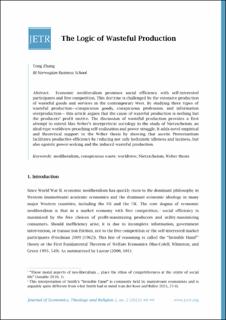| dc.contributor.author | Zhang, Tong | |
| dc.date.accessioned | 2024-01-19T14:44:32Z | |
| dc.date.available | 2024-01-19T14:44:32Z | |
| dc.date.created | 2022-08-12T16:16:55Z | |
| dc.date.issued | 2022 | |
| dc.identifier.issn | 2772-9001 | |
| dc.identifier.uri | https://hdl.handle.net/11250/3112886 | |
| dc.description.abstract | Economic neoliberalism promises social efficiency with self-interested participants and free competition. This doctrine is challenged by the extensive production of wasteful goods and services in the contemporary West. By studying three types of wasteful production—conspicuous goods, conspicuous profession, and information overproduction— this article argues that the cause of wasteful production is nothing but the producers’ profit motive. The discussion of wasteful production provides a first attempt to extend Max Weber’s interpretivist sociology to the study of Nietzscheism, an ideal-type worldview preaching self-realization and power struggle. It adds novel empirical and theoretical support to the Weber thesis by showing that ascetic Protestantism facilitates productive efficiency by reducing not only hedonistic idleness and laziness, but also egoistic power-seeking and the induced wasteful production. | en_US |
| dc.language.iso | eng | en_US |
| dc.title | The Logic of Wasteful Production | en_US |
| dc.title.alternative | The Logic of Wasteful Production | en_US |
| dc.type | Journal article | en_US |
| dc.description.version | publishedVersion | en_US |
| dc.source.volume | 2 | en_US |
| dc.source.journal | Journal of Economics, Theology and Religion | en_US |
| dc.source.issue | 2 | en_US |
| dc.identifier.cristin | 2042751 | |
| cristin.ispublished | true | |
| cristin.fulltext | original | |
